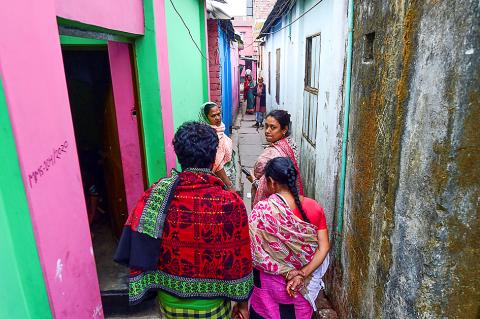Often treated as less than human in life, there has been little dignity in death for the sex workers of one of the world’s biggest brothels: their bodies frequently tossed into unmarked graves or dumped in the river.
Until now.
On Thursday last week, Hamida Begum became the first sex worker from Bangladesh bordello Daulatdia to receive a formal Islamic funeral, breaking a longstanding taboo in Muslim-majority Bangladesh, where prostitution is legal, but regarded by many as immoral.

Photo: AFP
Scores of women gathered at the graveside, weeping for the 65-year-old’s passing, but also because of the symbolic breakthrough her burial represented.
“I never dreamed that she would get such an honorable farewell,” said Begum’s daughter, Laxmi, who followed her mother into the trade.
“My mother was treated like a human being,” she said.
Muslim religious leaders have for decades rejected funeral prayers for sex workers, because they view prostitution as immoral.
When Begum died, her family planned to put her in an unmarked grave — standard practice for sex workers — but a coalition of sex workers persuaded the local police to talk religious leaders into giving her a proper burial.
“The imam was initially reluctant to lead the prayers, but we asked him whether Islam forbids anyone from taking part in the janaza [funeral prayers] of a sex worker. He had no answer,” said police chief Ashiqur Rahman, who oversaw negotiations.
Bangladesh is one of the few Muslim countries in the world where prostitution is legal for women aged 18 or older and workers are required to hold a certificate stating they are adults, and consent to the work.
The reality is more murky, as charities have reported finding girls as young as seven being groomed to sell sex, and say that trafficking of children for the trade is on the rise.
The police are often accused of being complicit — taking bribes from pimps and brothel owners to provide certification for girls much younger than 18.
Begum was just 12 years old when she began sex work in Daulatdia, where more than 1,200 women and girls cater for up to 5,000 clients a day.
The site, one of about 12 legal brothels operating in the country, is a series of shacks spread across a warren of alleyways about 100km west of Dhaka.
Close to a busy road and rail junction, it is frequented by local and long-haul drivers, and travelers passing through.
The brothel was established a century ago under British colonial rule, but moved to its current location, near a ferry station, after villagers torched the old complex in 1988.
The sex workers and hundreds of their children live in concrete and tin shanties on a sandbank of the Padma River — often paying exorbitant rents to unscrupulous landlords.
For those forced into the trade, they can only leave when they have paid off inflated and exorbitant “debts” to the pimps and madams that bought them.
Even if this is possible, the stigma surrounding sex work means that many feel there is nowhere else to go.
For decades, when one of them died, their bodies would be thrown in the river, or buried in the mud.
In the early 2000s, local authorities gave some wasteground for unmarked graves, and families would pay drug addicts to carry out burials — usually at night without formal prayers.
“If we wanted to bury the dead in the morning, villagers would chase us with bamboo sticks,” said Jhumur Begum, who heads a sex workers group.
“It was as if a dog has died,” said former sex worker Nili Begum, now a grandmother who lives in the brothel where her daughter now works.
There are hopes that Begum’s funeral will change things for all women in the brothels.
More than 200 mourners attended the religious ceremony, while 400 more went to the post-funeral feast and prayers, Rahman said.
“It was an unprecedented scene. People waited until late in the night to join the prayers. The eyes of sex workers welled up with tears,” he said.
Local authorities, councilors and regional police leaders backed his effort “to break this discriminatory taboo,” he said.
Hamida Begum’s 35-year-old daughter, who operates from the two-room shanty that her mother bought with her savings, said: “I hope from now on every woman who works here, including me, gets a janaza just the way my mother did.”
Jalil Fakir, a village councilor who attended the service, said the funerals for sex workers would go on in a bid to give fairer treatment in death.
“After all, who am I to judge her. If she has committed any sins, it will be Allah who will judge her in the afterlife, not any of us,” he said.

China on Monday announced its first ever sanctions against an individual Japanese lawmaker, targeting China-born Hei Seki for “spreading fallacies” on issues such as Taiwan, Hong Kong and disputed islands, prompting a protest from Tokyo. Beijing has an ongoing spat with Tokyo over islands in the East China Sea claimed by both countries, and considers foreign criticism on sensitive political topics to be acts of interference. Seki, a naturalised Japanese citizen, “spread false information, colluded with Japanese anti-China forces, and wantonly attacked and smeared China”, foreign ministry spokesman Lin Jian told reporters on Monday. “For his own selfish interests, (Seki)

VENEZUELAN ACTION: Marco Rubio said that previous US interdiction efforts have not stemmed the flow of illicit drugs into the US and that ‘blowing them up’ would US President Donald Trump on Wednesday justified a lethal military strike that his administration said was carried out a day earlier against a Venezuelan gang as a necessary effort by the US to send a message to Latin American cartels. Asked why the military did not instead interdict the vessel and capture those on board, Trump said that the operation would cause drug smugglers to think twice about trying to move drugs into the US. “There was massive amounts of drugs coming into our country to kill a lot of people and everybody fully understands that,” Trump said while hosting Polish President

Japan yesterday heralded the coming-of-age of Japanese Prince Hisahito with an elaborate ceremony at the Imperial Palace, where a succession crisis is brewing. The nephew of Japanese Emperor Naruhito, Hisahito received a black silk-and-lacquer crown at the ceremony, which marks the beginning of his royal adult life. “Thank you very much for bestowing the crown today at the coming-of-age ceremony,” Hisahito said. “I will fulfill my duties, being aware of my responsibilities as an adult member of the imperial family.” Although the emperor has a daughter — Princess Aiko — the 23-year-old has been sidelined by the royal family’s male-only

A French couple kept Louise, a playful black panther, in an apartment in northern France, triggering panic when she was spotted roaming nearby rooftops. The pair were were handed suspended jail sentences on Thursday for illegally keeping a wild animal, despite protesting that they saw Louise as their baby. The ruling follows a September 2019 incident when the months-old feline was seen roaming a rooftop in Armentieres after slipping out of the couple’s window. Authorities captured the panther by sedating her with anesthetic darts after she entered a home. No injuries were reported during the animal’s time on the loose. The court in the